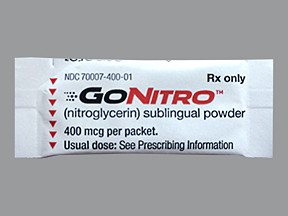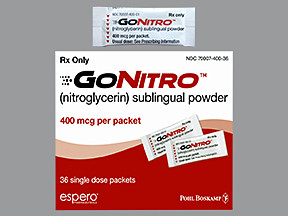NITROGLYCERIN POWDER PACKET - SUBLINGUAL
PHONETIC PRONUNCIATION: (NYE-troe-GLIS-er-in)
COMMON BRAND NAME(S): Gonitro
GENERIC NAME(S): nitroglycerin
Uses
USES: This medication is used to relieve chest pain (angina) in people that have a certain heart condition (coronary artery disease). It may also be used before physical activities (such as exercise, sexual activity) to help prevent chest pain. Nitroglycerin belongs to a class of drugs known as nitrates. Angina occurs when the heart muscle is not getting enough blood. This drug works by relaxing and widening blood vessels so blood can flow more easily to the heart.
How to use NITROGLYCERIN POWDER PACKET - SUBLINGUAL
HOW TO USE: Ask your doctor now for exact instructions on how to use your nitroglycerin and when to call for emergency medical help (911). Carefully read the Instructions for Use if available from your pharmacist before you start using nitroglycerin and each time you get a refill. If you have any questions, ask your doctor or pharmacist. If you are using this medication to relieve chest pain once it occurs, use it as soon as possible. If your chest pain has not improved or if it has worsened 5 minutes after you use this drug, call emergency medical help (911). Sit down before using this medication. Holding the packet upright and as close to your mouth as possible, tear open the packet and pour all of the powder under your tongue. Close your mouth right away and breathe normally through your nose. Let all of the powder dissolve before you swallow. Do not rinse your mouth or spit for 5 minutes after taking a dose. The dosage is based on your medical condition and response to treatment. A dose of this medication may be either 1 or 2 packets. Follow your doctor's instructions about how many packets you should take for each dose. After you take your first dose of nitroglycerin powder, you may take 1 more packet every 5 minutes, if needed. Do not take more than 3 packets of nitroglycerin powder within 15 minutes. If you are using this medication to prevent chest pain before physical activities, use it 5 to 10 minutes before the activity. If this medication is used very often, it may not work as well. Talk with your doctor if this medication stops working well.
Side Effects
Precautions
Interactions
Overdose
Images
Reviews
Disclaimer
IMPORTANT: HOW TO USE THIS INFORMATION: This is a summary and does NOT have all possible information about this product. This information does not assure that this product is safe, effective, or appropriate for you. This information is not individual medical advice and does not substitute for the advice of your health care professional. Always ask your health care professional for complete information about this product and your specific health needs.


No Reviews Yet